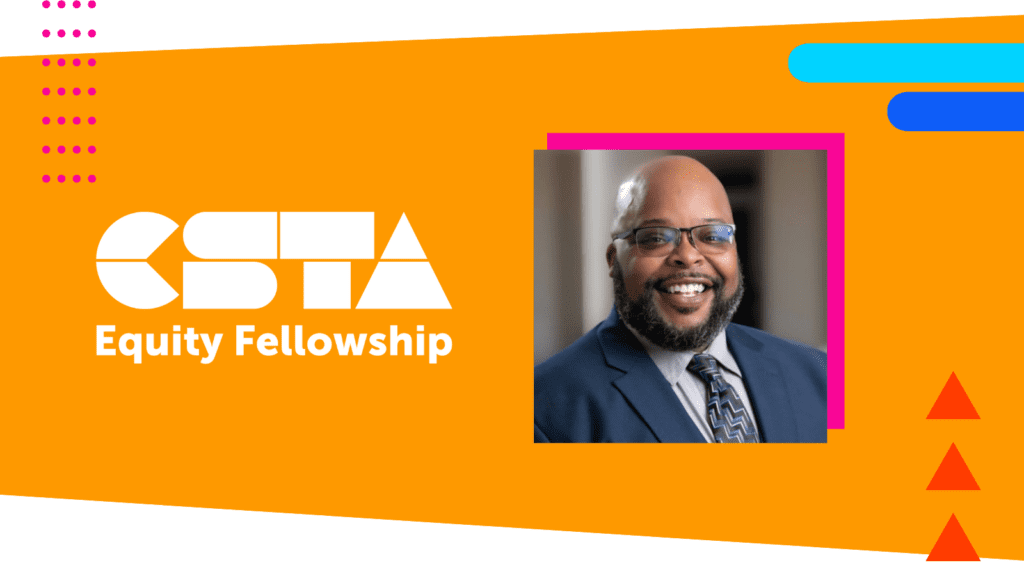Omar Shepherd is a project specialist in computer science with the San Bernardino County Superintendent of Schools, where he focuses on increasing CS equity and access for all students. Omar serves as an ambassador for CS for ALL Teachers and Girls Who Code, and he’s also a CSforALL SCRIPT facilitator and a board member for CUE (formerly Computer-Using Educators). He is involved with the Educator Workforce Investment Grant project, supporting efforts to build CS teacher capacity across the state of California.
Omar has always made it a point to create and participate in targeted outreach programs to serve students belonging to groups historically underrepresented in computer science. As a Girls Who Code ambassador, he’s introduced more than a hundred educators to the Girls Who Code club, from classroom teachers to administrators to afterschool program directors. For many of these educators, it was one of their first training experiences in computer science! These efforts support the development of a robust community of female students engaged with and excited to pursue computer science and other tech careers. Omar notes, “Educators who initially hesitated to engage in programming were inspired by the students’ enthusiasm and the community’s involvement, leading them to join the clubs in subsequent years.”
Another major initiative of Omar’s was the Orange County Robotics Consortium, which targets Latinx students and students from low-SES backgrounds. The program engaged students in grades 3–8 with physical computing and competitive robotics, using a targeted universal approach to ensure that every student was able to fully access the programs. Year over year, the number of participating teams has grown, as more students felt empowered to build their computer science identities through the robotics program.
“By continuously reflecting on my practices and collaborating with colleagues,” says Omar, “I work towards a more equitable and inclusive educational landscape. This commitment to equity drives my efforts to support both students and fellow educators in overcoming the systemic challenges that persist in computer science education.” He’s dedicated to capacity-building at the school, district, county, state, and national levels to create broad, consistent, lasting change in the landscape of CS education.
As a SCRIPT facilitator for CS for All, Omar has helped district and school leaders design resource maps and develop plans for comprehensive implementation of CS education. The SCRIPT approach helps to ensure that CS education plans are rolled out in a way that addresses barriers to access at every stage and provides fair opportunities to students from all backgrounds. On the state level, Omar is involved with a statewide CS learning initiative via the Seasons of CS grant project. The project provides regional professional development opportunities tailored to the local needs of various regions within California. These PDs were aligned with California’s educational standards for CS, as well as with the Kapor Center’s Equity Framework.
Heading into his time as a CSTA Equity Fellow, Omar looks forward to building strong relationships with his cohort and deepening his understanding of equity-driven leadership. He wants to learn from the perspectives of the other fellows, share strategies that have worked well in their various educational contexts, and work together to develop innovative solutions to the challenges that still exist within CS education.
Omar is particularly eager to use his fellowship to build upon the work that came out of the Seasons of CS grant. The “Elementary for Computing” professional learning series, originally developed in collaboration with Dr. Emily Thomforde, aims to build skills and confidence for educators with little to no experience in teaching CS. Omar hopes to continue developing the series in an online, modular format that integrates the CSTA Teaching Standards, makes space for peer-led sessions and collaborative workshops, and allows elementary CS educators to experience the content in a more flexible, accessible format.
“Through this fellowship,” says Omar, “I am eager to enhance my capacity as a courageous advocate for equity in computer science education.” He hopes to use his fellowship year to grow his skills, build his network, and become a more effective leader and change-maker in the field of CS education.

